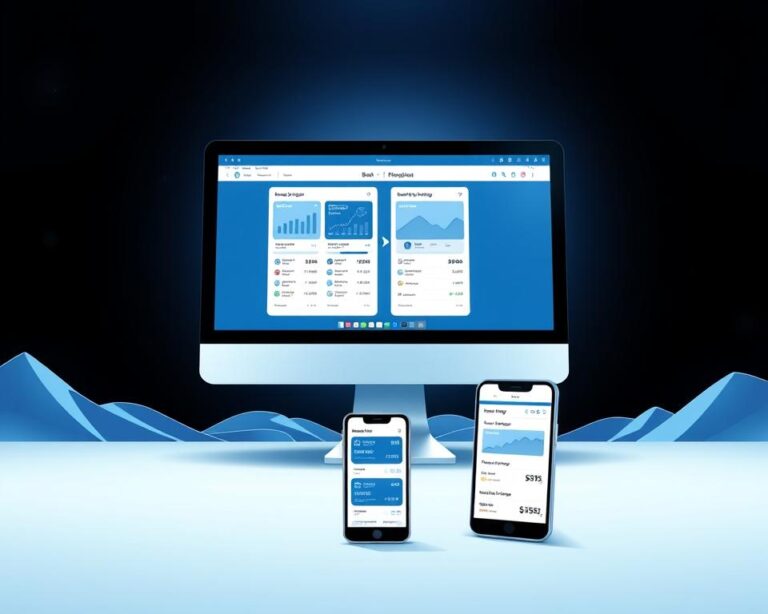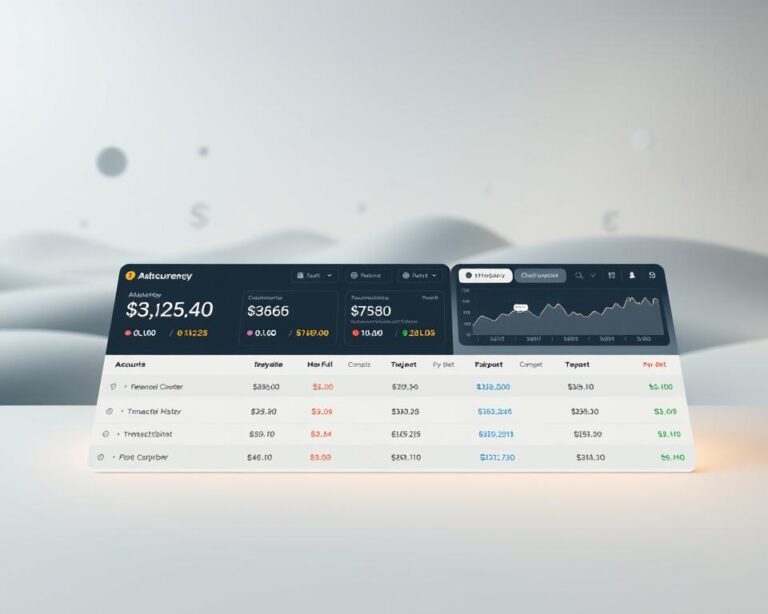Advertisement
Did you know about 1 in 10 Americans live abroad? Over 9 million U.S. citizens manage their money from foreign places. As more people move abroad, the need for good expat banking grows. It’s key for them to find banks that work well with international money management.
For U.S. citizens abroad, knowing about international banking is vital. They need to find banks that offer services made for expats. With the right bank, they can keep their finances stable, make transactions smoothly, and feel secure in their new homes.
Understanding Expat Banking
Expat banking is made for people living outside their home countries. It offers special financial services for expatriates. These services help manage money abroad, which is different from regular banking.
Expat bank accounts make it easy to send money across borders. They also let you handle money in different currencies. This is very helpful for those living in another country.
When you look into banking for expats, you’ll find online and mobile banking. This makes managing your money easy, no matter where you are. You also get good exchange rates, which can save you money when you send or receive money.
Expat banking also helps with banking rules and taxes in different countries. This means you can enjoy your new life without worrying about money issues.

Why Expat Banking is Essential for U.S. Citizens Living Abroad
For U.S. citizens living abroad, expat banking is key to managing money well. It offers easy access to funds, services tailored to expats, and lower fees. These are crucial for dealing with the challenges of managing money in another country.
Traditional U.S. banking can be tough for expats. It often has high fees for international withdrawals, limits access to local currency, and makes payments hard to make on time.
Expat banking solutions meet these needs with features for people living outside their home country. They help expatriates with everyday money tasks, like getting paid and paying bills in local currency. This makes managing money easier and more stable.
Knowing about expat banking is vital for U.S. citizens living overseas. It gives them global support, low fees, and access to local currency. This makes banking smoother, letting expats enjoy their new lives without money worries.

Top Features to Look for in Expat Bank Accounts
Exploring expat banking reveals key features to focus on. The right account choice depends on various factors. These factors can greatly improve your financial experience abroad.
Looking for accounts with low fees and good exchange rates is crucial. These aspects can save you money on international transactions. Choosing wisely can make managing your finances easier while living overseas.
Low Fees and Favorable Foreign Currency Exchange Rates
Low fees are a top priority for expat bank accounts. Look for accounts with low monthly fees and competitive foreign transaction charges. Good exchange rates also play a big role in managing money across borders.
Choosing a bank that focuses on these areas can cut down your banking costs. This can help you save money on international transactions.
Convenient Online and Mobile Banking Access
In today’s digital age, online and mobile banking is vital for expats. Having easy access to manage your finances is key. This means being able to check your account, transfer money, and pay bills anytime, anywhere.
Opting for banks with these features can improve your financial management. It makes handling your money easier, no matter where you are in the world.
Best Banks for Expats
Choosing the right bank while living abroad is key for expats. The best banks offer services that help manage international money well. Here are top banks that make banking easy, no matter where you are.
HSBC Premier: A Global Banking Solution
HSBC Premier is a top choice for expats. It offers a package with no annual fees if you meet balance requirements. With 62 countries covered, HSBC provides great global access and finance management services. Plus, it waives foreign transaction fees, making it even more appealing.
CitiGold: Wealth Management for Expats
CitiGold is great for expats who want wealth management. It offers personal finance services like investment advice and multi-currency accounts. With over 20 countries’ ATM networks, CitiGold makes accessing money abroad easy.
Capital One 360: No Fees and Easy Access
Capital One 360 is perfect for a simple banking experience. It has no monthly, foreign transaction, or ATM fees. Its easy-to-use online and mobile platforms make managing money straightforward, making it a top choice for expats.
| Bank | Key Features | Countries Available | Fees |
|---|---|---|---|
| HSBC Premier | Global accessibility, no foreign transaction fees | 62 | No annual fees (with balance conditions) |
| CitiGold | Personal finance services, wealth management | 20+ | Competitive fees |
| Capital One 360 | No monthly or transaction fees, easy online access | USA and international | No fees |
Offshore Banking Explained
Offshore banking means managing money in accounts outside your home country. It’s great for expats who want to manage their money better. This way, they can handle money in different currencies, no matter where they live. It’s key for those abroad to know about it, as it affects their money health a lot.
Benefits of Offshore Accounts for Expats
Offshore accounts have many good points, making them popular among those living abroad. The main benefits are:
- Enhanced privacy: Offshore accounts protect your financial info well.
- Financial flexibility: They let you use money in different currencies, making it easier to manage.
- Higher interest rates: Offshore banks often give better interest rates, helping your money grow.
- Efficient tax planning: They can help with taxes, based on the rules of both countries.
- Simplified financial management: An offshore account can make managing money from different places easier.
U.S. Citizens and Tax Implications Abroad
U.S. citizens living abroad face unique tax challenges. They must file U.S. taxes on all their income, even if they live in another country. This can cause confusion about their tax duties and the laws of their host country.
It’s important for expats to know about U.S. tax rules and the tax laws of their host country. Learning about deductions like the Foreign Earned Income Exclusion can help reduce taxes. Also, knowing the penalties for not meeting tax obligations is key for good financial planning.
Maintaining Your U.S. Account While Abroad
Many U.S. citizens living overseas face challenges in keeping their U.S. bank accounts active. To successfully keep a U.S. bank account abroad, it is essential to meet certain U.S. banking requirements set by banks. Understanding these requirements helps expats maintain accounts overseas without complications.
Requirements for Keeping Your U.S. Bank Account
To maintain a U.S. bank account while abroad, several key factors usually come into play:
- Having a valid U.S. mailing address and phone number is crucial for communication.
- Monitoring account activity can help ensure compliance with banking regulations.
- Some banks may impose minimum balance requirements to avoid fees.
- Being aware of potential restrictions on international transactions is essential.
By following these guidelines, expats can navigate the complexities of maintaining their U.S. bank accounts abroad.
Foreign Transaction Fees: What to Expect
For expats, understanding foreign transaction fees is key. These fees are usually 1% to 3% of each transaction. Over time, they can add up to a lot of money. Knowing how these fees impact your budget is important for financial planning.
Different banks charge different fees for foreign transactions. Some banks don’t charge these fees at all. This is great for people who often buy things or withdraw money in other countries. Choosing a bank without these fees can help save money.
Expats should also look into reimbursement options. Some banks offer to refund part of these fees. This can be a big help for those who do a lot of international transactions.
| Bank | Foreign Transaction Fee | Reimbursement Option |
|---|---|---|
| Chase | 3% | No |
| Capital One | 0% | Yes |
| HSBC | 2% | No |
| Citibank | 3% | Yes |
By comparing banks, expats can find the best deals on foreign transaction fees. This helps manage costs while living abroad. Being well-informed helps make smart financial choices, even when living outside your home country.
How to Transfer Money Internationally as an Expat
Transferring money abroad can be easy for expats with the right service. There are many ways to manage your money while living overseas. You can use wire transfers, online services, or remittance platforms. Each has its own benefits, so it’s important to choose wisely.
- Wire transfers are secure but can be pricey.
- Online services like PayPal and TransferWise are cheaper and faster.
- Remittance platforms are great for sending money to loved ones, focusing on speed and cost.
When picking the best way to transfer money, think about these things:
| Method | Average Fees | Transfer Speed | Exchange Rates |
|---|---|---|---|
| Wire Transfer | $30-$50 | 1-5 business days | Bank rate |
| Online Service | $0-$20 | Instant to 2 business days | Mid-market rate |
| Remittance Platform | $3-$10 | Instant to 3 business days | Variable rate |
Looking at fees, speed, and exchange rates helps you choose the best option. Knowing these details can help you plan your finances better while living abroad.
Choosing Between Online Banks and Traditional Banks
For expats, picking between online and traditional banks is key to managing money well. Online banks are known for their low fees and cool digital tools. They’re a hit with expats because they let you manage money online or through apps.
Traditional banks, however, offer a personal touch that many like. They have real branches where you can meet bank staff. This is great for expats who need help with banking rules or need face-to-face help.
When choosing a bank, think about what matters most to you. Do you want convenience and lower fees? Or do you prefer the personal service of a traditional bank? Knowing the differences helps expats make smart choices for their financial needs.
Top Credit Unions for Expats
Choosing the right financial institution is key for expatriates. Credit unions offer services that traditional banks might not. They focus on unique needs like low fees, easy access, and personal service.
Navy Federal Credit Union: Benefits for Military Families
Navy Federal Credit Union helps military families. It offers benefits like no fees for international ATM use and good interest rates. This makes Navy Federal a great choice for those moving abroad.
State Department Federal Credit Union: Exclusivity and Perks
State Department Federal Credit Union is for specific clients. It offers great services and low balance needs. Expats working for the federal government get fee reimbursements and access to many ATMs. These perks make State Department Federal a top choice for expats.
| Credit Union | Key Benefits | Eligibility |
|---|---|---|
| Navy Federal Credit Union | Fee-free international ATM access, tiered dividend rates | Military families |
| State Department Federal Credit Union | Reimbursement for foreign transaction fees, low balance requirements | Federal government employees |
The Role of Customer Service in Expat Banking
Quality expat banking customer service is key for expats dealing with international banking. Their needs differ from locals, making good support even more important. Banks that offer great support can help with account access, transaction questions, and following foreign rules.
The value of banking support is huge for expats. Time zone issues can make talking to banks hard. So, banks need to offer many ways to get help, like phone, chat, and email. A good customer service team can make banking easier and more satisfying.
Conclusion
Choosing the right bank is key for U.S. expats to manage their money abroad. It’s important to look for accounts with low fees and good exchange rates. Also, having easy online access is a big plus.
The right bank can make your life easier while you’re living overseas. It gives you peace of mind and helps you adjust to your new life.
When picking a bank, think about what you need and want. This article has given you a summary of what to look for. Look at fees, customer service, and more to find the best fit for you.
By making smart choices, you can make your money work for you. This freedom lets you enjoy your time in your new country even more.



